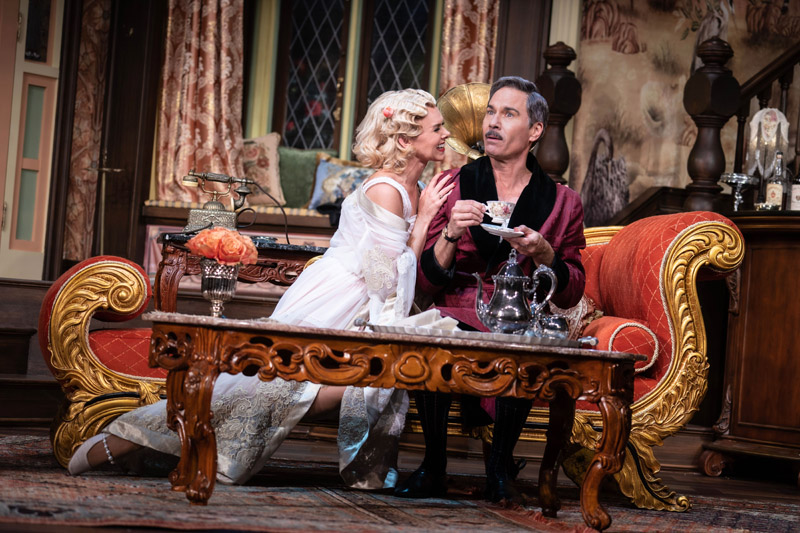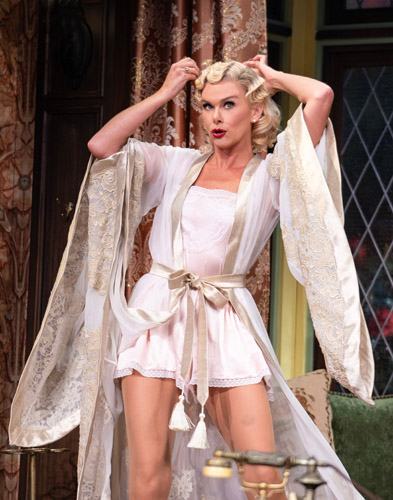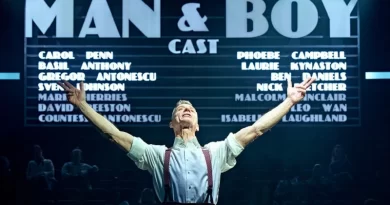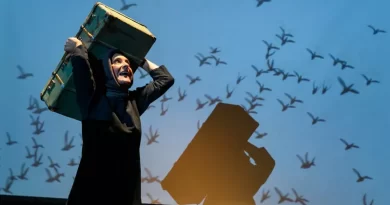“The Cottage”, Helen Hayes Theatre, New York
Glenda Frank in Manhattan
22 August 2023
Towards the end of Act II of The Cottage, the comedy takes a new turn and almost saves itself. “Saves itself” is an odd phrase to use for a work that is proving palatable to audiences who laughed non-stop at the performance I attended.

Laura Bell Bundy and Eric McCormack.
Photo credit: Joan Marcus.
Sandy Rustin is one of the most staged playwrights in America, according to American Theatre magazine. But this farce of mismatched lovers, deception, and the delusions of romance, set in Moreton-in-Marsh, England, 1923, feels like a script written during the period. It’s familiar, well-trodden ground that has had life pumped into it by director Jason Alexander’s stage business and the over-the-top comedic performances. Alexander has been making a directorial name for himself since his wildly popular portrayal of George Costanza on Seinfeld, the TV series that ran from 1989 to 1998.
Beau and Clark are the public school (counterintuitively that is elite private school) brothers who’ve found each other’s wives appealing and enjoyed their charms in mommy’s rural cottage. Although Rustin emphasizes the influence of Oscar Wilde and Noël Coward in the opening scenes, The Cottage has little of their insight or wit.
The first lovers, Beau (Eric McCormack, The Music Man on Broadway and “Will and Grace,” the television series) and Sylvia, his sister-in-law (Laura Bell Bundy, Legally Blonde), pose and posture in a parody of seduction. They have been meeting for seven years, but this year Sylvia sends everyone telegrams – to Beau’s dismay – announcing that they are a couple. Seems Beau has another side affair on a more recurrent schedule. Soon the cottage is filled with the indignation, confessions, and confrontations of six lovers – and a sort-of loaded pistol.

Laura Bell Bundy as Sylvia.
Photo credit: Joan Marcus.
Director Alexander uses every entrance possible, including a chest near the window so the action never flags. Cigarettes are hidden in a dozen or so unexpected places as are matches and lighters, even on a miniature replica of Michelangelo’s David. The performers self-characterize with their own stylized gestures — and spoofs of the mostly upper-class British accents. Characters hide, pratfall, change places, and perform many of the exaggerated actions we associate with farce. Lilli Cooper (Tootsie) as Majorie, the very pregnant wife of one brother and mistress of the other, brought down the house with an extended fart joke.
But when Richard/William (Nehal Joshi, All My Sons ) unmasks (or rather unbeards), the play changes course. Sylvia, our much-rejected heroine, having lost husband and lover to other women, seems stuck with Richard/William, a lost lover with a rather unsavoury character. But mother saves the day. The brothers learn that their mother has passed. Her will divides the estate in half, except for the cottage, which is all Sylvia’s. Everyone, hoping to inherit the love nest, is jealous. Having had enough of attachments, Sylvia is delighted to become an independent woman and even more delighted when the hunk of a gardener (Tony Roach) arrives to greet the new owner.
Another welcome touch to this conventional comedy is the reaction to class and social status. Beau, claiming to be madly in love with Dierdre, rejects her forcefully when he discovers she had been a prostitute. McCormack, a fine actor, makes us feel his revulsion. Now there’s a play worthy of Wilde, characters pulling off social masks and rejecting conventions.
The realistic set by Paul Tate de Poo III received a round of applause and the costumes by Sydney Maresca were unobtrusively splendid.









